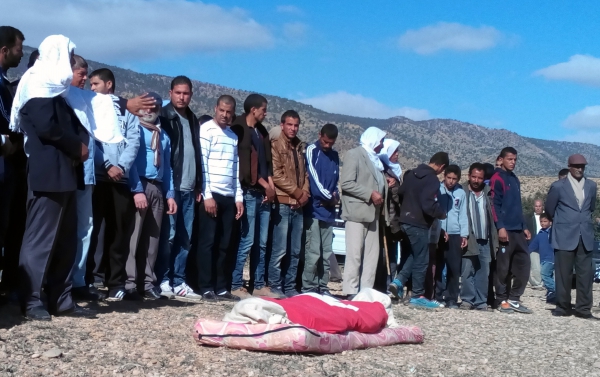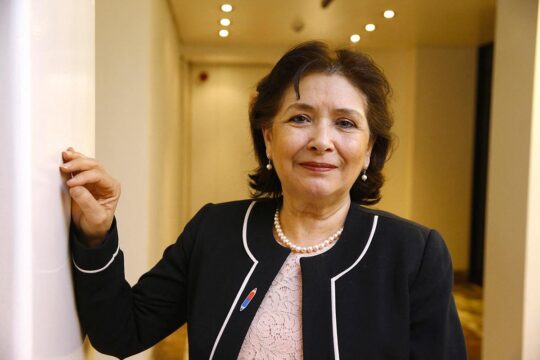On Sunday November 15, Tunisian public television director Mustapha Ben Letaief was fired by Prime Minister Habib Essid over the broadcast of a video. The television had broadcast in its 1 PM news the previous day a video showing the decapitated head of a 16-year old shepherd who was victim on November 13 of a terrorist act. The young man, Mabrouk Soltani, lived in the poor and isolated Jelma region of central-west Tunisia (Sidi Bouzid region), near mountains bordering Algeria where terrorist groups are active.
The video, shot from a distance, shows the head covered with a shawl inside a plastic bag in the family’s refrigerator.
“This video cannot be called a serious professional error as the National Union of Tunisian Journalists was quick to say,” says Rachida Enneifer, a lawyer and former member of the High Independent Broadcasting Authority (HAICA).
“The commentary of the report says: ‘the body of the shepherd has not yet been found, owing to lack of response by the security forces. The victim’s family has therefore mobilized to search for his remains.’ And although the editor in chief was sanctioned with dismissal by his boss Mustapha Beltaief on November 14, Beltaief was then fired himself. With just a phone call, like in the times of the dictatorship…”
“Disregard for the regulator”
Professor Larbi Chouikha of the Press and Information Sciences Institute says this was a pretext. “The firing of Mustapha Ben Letaief is really a way for the authorities to sanction him for refusing to relay the signal of Nessma TV, the private station given exclusive rights to broadcast the whole Nobel Peace Prize ceremony (editor’s note: this year awarded to the Tunisian “Quartet”) that was organized by the Presidency on November 9,” says Chouikha, who has authored a book on the Tunisian transition and the press. “There is a risk now that public media will be undermined, as authorities have refused to reform them as necessary whilst at the same time strengthening private media that have allegiances to the powers-that-be.”
The independent broadcasting authority HAICA, set up in May 2013, was not consulted on the firing of Ben Letaief. Yet the former government of Mehdi Jomaâ sought its approval when he was appointed in June 2014.
HAICA president Nouri Lejmi slammed the decision of the Essid government, calling it “disregard for the role of the regulator” and “a step backwards”.
It also drew sharp criticism from Reporters without Borders (RSF) and Article 19, who said the authorities’ dismissal of the television director and interference in evaluating journalists’ professionalism was a route to “arbitrary decision making” and “undermining public confidence in these institutions”. “To ignore the HAICA’s existence is also to ignore all the work it has done and the progress made since 2011 in democratic regulation of the media sector,” the two organizations said in a joint statement.
Jail sentences for journalists
On November 17, the Justice Minister requested a judicial investigation to determine who was responsible for the “blunder”. This move is causing great concern in the media and press freedom organizations, especially since the authorities refer in this case not to the law on press freedom but a new anti-terrorism law adopted by parliament on August 5, 2015. In particular, they refer to Article 31 of the law on “supporting terrorism”, which can bring punishment of up to five years in jail for journalists and a fine of 5,000 to 10,000 dinars (2,200 to 4,400 Euros).
Mondher Charni is an expert at the Tunis Centre for press freedom. He is of one of the rare lawyers in the country specializing in the rights and obligations of journalists, a field that did not exist during the dictatorship. “Supporting terrorism implies that the images broadcast were propaganda for the Jihadists and that the accompanying words were incitement to commit terrorist acts or join terrorist groups,” he says. “But that was not at all the case here.” Mondher Charni still hopes the Justice Minister will reverse his decision and class the case as one of professional ethics.
“Public security and terrorism can become a sword of Damocles hanging over journalists’ heads,” warns Larbi Chouikha. “Let’s not forget what happened in Tunisia in 1990, when the black decade of the Algerian civil war and the Gulf War served as pretexts for the Ben Ali regime to clamp down on the press. What I fear is a return to an authoritarian way of organizing the public space.”
A vague and ambiguous law
Twice in 2015, Tunisian civil society groups and international organizations raised concerns about the threat the “anti-terrorism and anti-money laundering” law could pose to press freedom.
“The draft law’s use of vague terms to describe terrorist acts, such as ‘supporting terrorism’, leaves the way open for highly subjective interpretations,” says an April 30 statement from groups including RSF, Article 19, the Vigilance Association, Tunis Centre for Press Freedom, Bawssala Association and the International Federation for Human Rights (FIDH). “These could result in unacceptable pressure on the media when reporting news related to terrorism or the authorities’ response to it or criticisms of government policy.”
When the anti-terrorism law was approved by Parliament, 15 unions and human rights groups expressed regret that the authorities had not taken civil society’s views into account on the articles related to “threats to rights and freedoms in Tunisia”.
Back to the past?
“Why this policy of double standards targeting media professionals?” asks Mahmoud Dhaouadi, director of the Tunis Centre for Press Freedom. “Dozens of recorded attacks on journalists doing their job have gone unpunished and at the same time when a journalist commits a professional error he is threatened almost immediately with judicial sanctions. Do the authorities see journalists as enemies that should be silenced?”
Is the government’s anti-terrorism strategy, which opinion polls suggest most Tunisians support, serving as a way to restrict freedom of expression and gag journalists of the public media (“the first targets”, according to Professor Chouikha)? The chain of reactions and decisions provoked by the Mabrouk Soltani video has provoked a host of suspicions in the profession, especially since covering terrorism has become almost a daily task for journalists. After the Bardo attacks on March 18 (22 victims), the Sousse attacks on June 26 (38 victims) and the many Jihadist attacks on security forces (hundreds of dead and injured), another attack took place against a presidential guard bus on Tuesday November 24, leaving 12 dead.
“Is the freedom obtained after the January 14 Revolution just temporary?” asks Professor Chouikha. “Are we moving to a situation like in Turkey where underneath the façade of a secular, democratic state, one party controls the media?”
The “supporting terrorism” article of the August 5 law is already raising the old demons of the Tunisian press: fear, censorship, self-censorship and lack of proper regulation.






